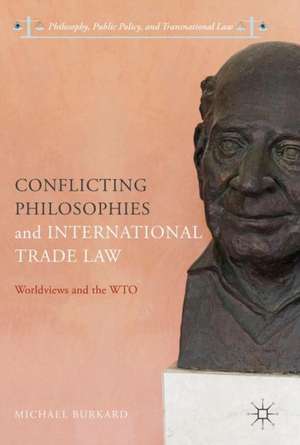Conflicting Philosophies and International Trade Law: Worldviews and the WTO: Philosophy, Public Policy, and Transnational Law
Autor Michael Burkarden Limba Engleză Hardback – 27 oct 2017
| Toate formatele și edițiile | Preț | Express |
|---|---|---|
| Paperback (1) | 588.50 lei 6-8 săpt. | |
| Springer International Publishing – 23 aug 2018 | 588.50 lei 6-8 săpt. | |
| Hardback (1) | 791.09 lei 6-8 săpt. | |
| Springer International Publishing – 27 oct 2017 | 791.09 lei 6-8 săpt. |
Preț: 791.09 lei
Preț vechi: 964.74 lei
-18% Nou
Puncte Express: 1187
Preț estimativ în valută:
151.42€ • 164.53$ • 127.28£
151.42€ • 164.53$ • 127.28£
Carte tipărită la comandă
Livrare economică 21 aprilie-05 mai
Preluare comenzi: 021 569.72.76
Specificații
ISBN-13: 9783319610665
ISBN-10: 331961066X
Pagini: 442
Ilustrații: XIX, 442 p.
Dimensiuni: 148 x 210 x 35 mm
Greutate: 0.7 kg
Ediția:1st ed. 2018
Editura: Springer International Publishing
Colecția Palgrave Macmillan
Seria Philosophy, Public Policy, and Transnational Law
Locul publicării:Cham, Switzerland
ISBN-10: 331961066X
Pagini: 442
Ilustrații: XIX, 442 p.
Dimensiuni: 148 x 210 x 35 mm
Greutate: 0.7 kg
Ediția:1st ed. 2018
Editura: Springer International Publishing
Colecția Palgrave Macmillan
Seria Philosophy, Public Policy, and Transnational Law
Locul publicării:Cham, Switzerland
Cuprins
1. Introduction.- 2. Between Positivism And Relativism.- 3. Two Concepts of Reality.- 4. Two Concepts of Risk.- 5. Two Functions of Risk.- 6. The Battle for Agriculture.- 7. A Promise for Objectivity.- 8. The Panel’s Positivist Position.- 9. The Appellate Body’s Quest for Middle Ground.-10. The Positivist Solution.- 11. The Relativist Response.- 12. A Critical Approach.- 13. Annex: Synopsis of Reform Proposals.
Notă biografică
Michael Burkard is a legal practitioner with broad experience in judiciary, administration and the legal profession. As staff member of the finance committee of the Swiss Federal Parliament, he gained insights into legislation, finance and economic policy. He received his PhD from the Institute of European and International Economic Law at the University of Bern, Switzerland, where he concentrated on European and WTO law, customs legislation, the WTO Agreement on Agriculture and economic development. This book is an outcome of the research project “NCCR Trade regulation” funded by the Swiss National Science Foundation.
Textul de pe ultima copertă
This book reveals how conflicting worldviews are at the root of public controversies on policy and trade issues. It highlights the particularly controversial disputes at the level of the World Trade Organization in the case of regulating beef-hormones and GMOs, aiming to show how negotiators of international agreements, members of dispute settlement bodies, and policy makers in general could have recourse to concepts of other disciplines such as epistemology and philosophy in order to address deadlocked legal disputes. Ultimately, the book is a manifesto for independent and critical research.
Caracteristici
Uses epistemological concepts to address deadlocked problems in international law, offering an interdisciplinary perspective that combines political economy, international trade law, and philosophy Addresses controversies of the World Trade Agreement around the SPS Agreement on food safety and animal and plant health measures as a case study of international decision-making Speaks to negotiators, members of dispute settlement bodies, policy makers, and scholars interested in new approaches for mitigating increased tensions in international law Reflects on the symbiotic relationship between scientific discovery and economic progress which emerged in the Age of Enlightenment and is anew challenged by populist Romanticism Includes supplementary material: sn.pub/extras








